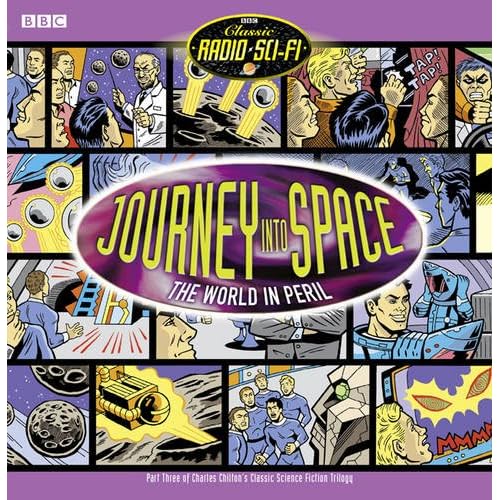We reviewed the first series of Journey into Space
here, and very good it was too.
There was a series two between then and this one, in which the intrepid crew of the Discovery visited Mars and had some hi-jinx there.
We join them as they head back to Earth, but of course it is not long before they are plunged headfirst into yet another adventure.
The first thing you’ll notice about this tale is the length. There are twenty half hour long episodes of the story, as well as a few extras that I’ll come to in due course.
So, twenty episodes. That’s just about ten hours of story. In a story of this length, you have to expect some flab, and there is – but not as much as you would think. A good recent series to compare this to is the Torchwood story Miracle Day, which was spread too thin over the same length of time as Journey into Space.
But where Torchwood filled this vacuum with pointless capture and escape scenes and overlong cuts, Charles Chilton does it by having his characters have a conversation, so while they may not be advancing the plot, it is at least interesting.
There are also some clever scenes that could only work on radio. We spend a couple of episodes in the pitch darkness, for example. And it is a mark of just how good the storytelling is that I was listening to this and wondering how the actors could get about in the dark so well, forgetting that is was all pretend!
The main plot presents a slight hiccup for those of us who have not listened to series two, as it does refer back to a lot of things that happen there. While is not totally essential to have heard the previous series, as Chilton does well to fill in any gaps, I did feel a bit left out at times.
I also had a niggling problem with this and the previous series, and it took until episode seventeen here until the penny dropped as to what it was. My problem is Jet Morgan.
Yes, he is the hero of the hour, but he really rubs me up the wrong way. Most of this is, I suspect, because I’m looking at it through the wrong end of fifty years of history in which the class system has moved on somewhat (although looking at our current government you’d be forgiven in thinking it hadn’t) and his behaviour, particularly towards the ever loyal Lemmy, should be seen as a product of the time. The other reason is that he seems to do hardly anything but bark orders at the rest of the crew… anyway: discuss!
As is the way in most sci-fi, the plot concerns (as the title of the adventure may tell you) the Earth being under terrible threat. But it is the nature of this threat, or more specifically, the delivery method of it, that provided me with the most entertainment.
I’ll not say much more about it, but to me it reads like Chilton giving a delightfully cheeky two-fingers to the opposition.
The final two discs contain a more recent (1981) adventure that acts as an epilogue to the main story. It jars if listened to immediately after the main event though, because it features all new actors in the main roles and it takes a while to get their voices fixed in that part (although one of them is the legendary Ed Bishop, so all is good). While this is a good story, and one with an interesting scientific grounding, it doesn’t ‘feel’ as much like a Journey into Space story as the one before. Part of this is, I think, the fact that this one was written in a post Star Trek, post Doctor Who world, and it feels like the narrative has been informed by they storytelling in those shows.
There is also a radio documentary about the series. Or at least should be! Further investigation has shown I have a duff, early copy, of the set with this missing, but
AudioGo will replace any of these faulty sets, so fear not if you have one too!
I will say though, that if it’s anything like the interview section on the first series, it will be well worth the effort.
As I said in the previous review: there is usually a very good reason something is considered a classic.
Essential listening.



































